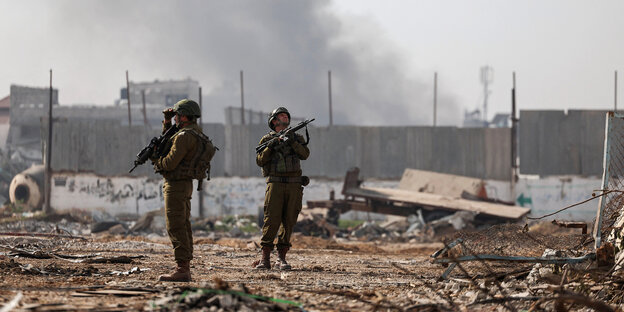The International Court of Justice rejects the request to stop the attacks. But Israel must take steps to prevent genocide.

Israel's military operation in Gaza is allowed to continue, but soldiers must not commit genocide or incite each other to do so. Photo: Ronen Zvulun/Reuters
THE HAGUE/RAMALLAH/BERLIN taz | In a first decision on Israeli military action in Gaza, the International Court of Justice (ICJ) in The Hague did not, as South Africa had hoped, require Israel to immediately end hostilities. However, the court ordered Israel to do “everything in its power” to prevent genocide in Gaza.
The UN's top court also declared itself responsible for ruling on South Africa's claim that Israel was committing genocide in Gaza.
The emergency measures, which the 17-member judicial panel adopted almost unanimously, are aimed at protecting the lives of Palestinians in Gaza, said Joan Donoghue, the president. Specifically, Israel now has to ensure that its military does not commit acts covered by the United Nations Genocide Convention. The country must also take measures to prevent and punish genocide and its calls, and improve the humanitarian situation in Gaza. Within one month, the Court must be informed of the measures taken, which will then transmit them to South Africa.
The ICJ called on Hamas to release the remaining Israeli hostages “immediately and unconditionally.”

South Africa is happy
The ruling is binding, but the Court does not have the means to execute it. By holding Israel responsible for the implementation of the measures, it still adds weight to the ruling. The South African government expressed its satisfaction and spoke in a statement of a “convincing victory for international law and a milestone in the search for justice for the Palestinian people.”
It will probably take several years before the Court issues a final ruling. The trial began two weeks ago with the presentation of the South African prosecution. It accuses Israel of genocide, due to “the actions threatened, used, tolerated, undertaken and currently carried out against the Palestinian people as a result of the attacks in Israel on October 7, 2023.” Israel, on the other hand, invokes its right to self-defense and emphasizes that Hamas' massacres against Israeli civilians constitute genocide.
In her reaction to Friday's verdict, Federal Foreign Minister Annalena Baerbock (Greens) stressed that Hamas is also bound by international humanitarian law and must eventually release all hostages. “We will support this with all our might, as well as the measure ordered by Israel to urgently allow more humanitarian aid into Gaza,” she explained. Provisional measures are binding under international law. “Israel must adhere to this.”
Baerbock had already made unusually harsh comments about the Israeli army's attacks on Khan Yunis. “There are also norms regarding the right to self-defense and international humanitarian law also applies to the fight against terrorists,” Baerbock said. He again called on Israel to allow more humanitarian aid into Gaza and to adjust its military strategy. People couldn't just disappear into thin air. “That is why it is not enough to ask that we leave these places, but ultimately a humanitarian ceasefire is needed, also so that all the hostages are finally released.” In early January, Baerbock had already asked Israel to send more aid. Supplies to the Gaza Strip during a visit to the Egypt-Israel border crossing in Rafah allow this.
Disappointment in Ramallah
As at the beginning of the process, protesters from both groups were present in front of the court and followed the events through their own screens. On the Palestinian side, spokeswoman Nadia Slimi expressed confidence that the verdict will bring justice for the people of Gaza. A pro-Israel demonstration was taking place on the corner. There, Nico van Noordt, a Rotterdam resident, commented: “A conflict in which one party wants to kill you, but you want to live, cannot be resolved, because you cannot live halfway.”
In cities across the West Bank, Jerusalem and Israel, streets were deserted when the verdict was announced. Due to heavy rain, a cold wave and the start of the weekend, solidarity events planned on the Palestinian side were cancelled. In Ramallah City Hall alone, a few hundred guests gathered to follow a live broadcast from The Hague under the title “Thank you, South Africa.”
Many are disappointed that the judges in The Hague do not call for a ceasefire. “I think of the families in Gaza because of the cold,” says student Abla Saleh, who arrived in Ramallah from a Jerusalem suburb. “Only 80 kilometers from here they are starving in self-made tents and at this moment bombs are falling.”
For many Palestinians, however, the fact that Israel's actions were negotiated in The Hague is a success. “It is clear to me that Netanyahu would not have recognized a ceasefire,” said Shatah Hanaysha, a journalist. But the 26-year-old hopes that growing pressure from the international community following the verdict can at least stop the current escalation in the West Bank.
“I hope that future supervision by the court will gradually calm the situation,” said Mohammad Al-Liftawi, a merchant in Jerusalem's Old City. “Without tourists we will soon be bankrupt,” he warns. “So, in addition to the genocide in Gaza, the situation in the West Bank will also explode.”